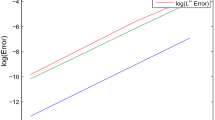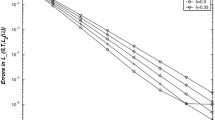Abstract
A reaction-diffusion problem with a Caputo time derivative of order \(\alpha \in (0,1)\) is considered. The solution of such a problem has in general a weak singularity near the initial time \(t = 0\). Some new pointwise bounds on certain derivatives of this solution are derived. The numerical method of the paper uses the well-known L1 discretisation in time on a graded mesh and a direct discontinuous Galerkin (DDG) finite element method in space on a uniform mesh. Discrete stability of the computed solution is proved. The error analysis is based on a non-trivial projection into the finite element space, which for the first time extends the analysis of the DDG method to non-periodic boundary conditions. The final convergence result implies how an optimal grading of the temporal mesh should be chosen. Numerical results show that our analysis is sharp.
Similar content being viewed by others
References
Bassi, F., Rebay, S.: A high-order accurate discontinuous finite element method for the numerical solution of the compressible Navier–Stokes equations. J. Comput. Phys. 131, 267–279 (1997)
Cockburn, B., Shu, C.W.: The local discontinuous Galerkin method for time-dependent convection–diffusion systems. SIAM J. Numer. Anal. 35, 2440–2463 (1998)
Courant, R., Hilbert, D.: Methods of Mathematical Physics, vol. I. Interscience Publishers Inc., New York, N.Y. (1953)
Diethelm, K.: The Analysis of Fractional Differential Equations, Volume 2004 of Lecture Notes in Mathematics. An Application-Oriented Exposition Using Differential Operators of Caputo Type. Springer, Berlin (2010)
Gracia, J.L., O’Riordan, E., Stynes, M.: Convergence outside the initial layer for a numerical method for the time-fractional heat equation. In: Dimov, I., Faragó, I., Vulkov, L. (eds.) Numerical Analysis and Its Applications, Volume 10187 of Lecture Notes in Computer Science, pp. 82–94. Springer, Cham (2017)
Henry, D.: Geometric Theory of Semilinear Parabolic Equations, Volume 840 of Lecture Notes in Mathematics. Springer, Berlin (1981)
Jin, B., Lazarov, R., Pasciak, J., Zhou, Z.: Error analysis of semidiscrete finite element methods for inhomogeneous time-fractional diffusion. IMA J. Numer. Anal. 35(2), 561–582 (2015)
Jin, B., Lazarov, R., Zhou, Z.: Error estimates for a semidiscrete finite element method for fractional order parabolic equations. SIAM J. Numer. Anal. 51(1), 445–466 (2013)
Kopteva, N.: Error analysis of the L1 method on graded and uniform meshes for a fractional-derivative problem in two and three dimensions (2017). arXiv:1709.09136v3
Liu, H.: Optimal error estimates of the direct discontinuous Galerkin method for convection–diffusion equations. Math. Comp. 84(295), 2263–2295 (2015)
Liu, H., Yan, J.: The direct discontinuous Galerkin (DDG) method for diffusion with interface corrections. Commun. Comput. Phys. 8(3), 541–564 (2010)
Luchko, Y.: Initial-boundary-value problems for the one-dimensional time-fractional diffusion equation. Fract. Calc. Appl. Anal. 15(1), 141–160 (2012)
Podlubny, I.: Fractional Differential Equations, Volume 198 of Mathematics in Science and Engineering. An Introduction to Fractional Derivatives, Fractional Differential Equations, to Methods of Their Solution and Some of Their Applications. Academic Press, Inc., San Diego (1999)
Sakamoto, K., Yamamoto, M.: Initial value/boundary value problems for fractional diffusion-wave equations and applications to some inverse problems. J. Math. Anal. Appl. 382(1), 426–447 (2011)
Samko, S.G., Kilbas, A.A., Marichev, O.I.: Fractional Integrals and Derivatives. Gordon and Breach Science Publishers, Yverdon (1993). (Theory and applications, Edited and with a foreword by S. M. Nikolskiĭ, Translated from the 1987 Russian original, Revised by the authors)
Shen, J., Tang, T., Wang, L.-L.: Spectral Methods, Volume 41 of Springer Series in Computational Mathematics. Algorithms, Analysis and Applications. Springer, Heidelberg (2011)
Stynes, M., O’Riordan, E., Gracia, J.L.: Error analysis of a finite difference method on graded meshes for a time-fractional diffusion equation. SIAM J. Numer. Anal. 55(2), 1057–1079 (2017)
Wei, L., Zhang, X., He, Y.: Analysis of a local discontinuous Galerkin method for time-fractional advection–diffusion equations. Int. J. Numer. Methods Heat 23(4), 634–648 (2013)
Author information
Authors and Affiliations
Corresponding author
Additional information
Communicated by Jan Hesthaven.
The research of Martin Stynes is supported in part by the National Natural Science Foundation of China under Grants 91430216 and NSAF-U1530401.
Rights and permissions
About this article
Cite this article
Huang, C., Stynes, M. & An, N. Optimal \(L^\infty (L^2)\) error analysis of a direct discontinuous Galerkin method for a time-fractional reaction-diffusion problem. Bit Numer Math 58, 661–690 (2018). https://doi.org/10.1007/s10543-018-0707-z
Received:
Accepted:
Published:
Issue Date:
DOI: https://doi.org/10.1007/s10543-018-0707-z




